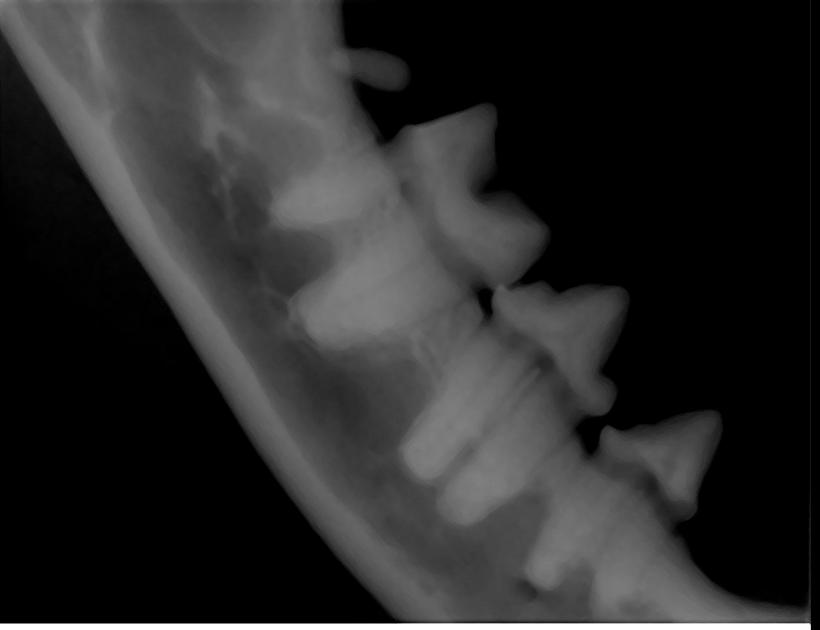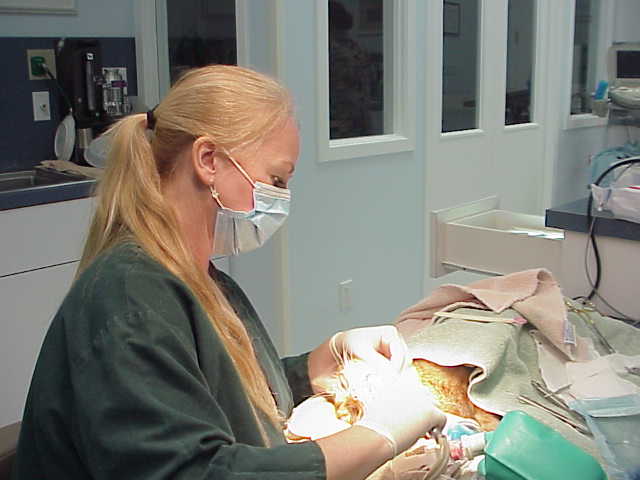The Importance of Feline Dental Care
Dental disease is an often-overlooked threat to the comfort and health of your pet. Because dental disease often has few readily apparent signs, bringing your pet in for a wellness examination is the only way to ensure detection. Following this exam, your veterinarian may recommend a particular dental cleaning schedule, oral care routine, or special treatment based on your pet's dental health needs. We also use dental X-rays to fully examine your pet's oral and dental health.
In order to help promote good oral health, we recommend mixing a dental care diet into your cat's maintenance food. Since your cat's adult teeth will have all come in at around 6 months of age, we also recommend that your cat visit for a fluoride application at that time. Fluoride helps strengthen tooth enamel and this visit also allows us to assess whether your cat has any retained baby teeth or missing adult teeth that could cause problems in the mouth later on. Some kittens even have some plaque or tartar buildup at this age! If this is the case, we will clean the tartar from the teeth and will want to follow up with your cat to ensure that early dental disease is not a problem.
How do I know if my pet has dental disease? 
Dental disease is the most common disease seen by veterinarians: 70-85% of pets over the age of 2 have some form of dental disease. Most cats with significant dental disease are still eating normally, despite dangerous infections or painful teeth.
Here are some signs that your pet may have dental disease:
- Bad breath
- Yellow, brown, or discolored teeth
- Loose teeth, broken teeth, or teeth that sit at odd angles
- Red, inflamed gums
- Swollen face, mouth, jaws, or gums
- Drooling or discharge from the mouth
- Doesn't play with toys as often
- Pain when eating (rare)
It is important to have your cat checked for dental disease, as this disease can have major impacts on your cat's organs, including the heart, liver, and kidneys.
What about the risks of anesthesia?
Though very small, anesthesia is a very real risk for cats, just as it is for humans. At Exclusively Cats Veterinary Hospital, we take care to further reduce the risks of anesthesia by following a proactive protocol to assess our patients and monitor their care throughout the dental procedure, including pre-anesthetic testing, inhalant gas, electronic monitoring, and intravenous fluids.
We perform pre-surgical blood work for each of our patients prior to placing them under anesthesia. Our dental team monitors each patient throughout the dental procedure to ensure the patient is responding appropriately to the anesthesia. We use very safe anesthetics and monitor your pet for any adverse reactions as they recover.
Please remember, the adverse effects of bad teeth on the overall health of your cat greatly outweigh the anesthetic risk.

Does my pet have to stay overnight after the dental procedure?
Generally, routine dental care is an outpatient procedure. The procedure is performed in the early afternoon. Patients are generally ready to return home after 5 pm the same day. Pets receiving advanced dental procedures with X-rays and extractions are still generally dismissed the same day. If your pet's dental surgery is more extensive and he or she would benefit from additional pain medication or extended IV fluid therapy, we may recommend an overnight stay.
How long can my pet go between dental cleanings?
Typically, after the age of 2 or 3, cats will need a dental cleaning every 1 to 2 years - if performed prior to dental disease, this is called a prophylaxis - meaning that it will prevent or delay the onset of disease. Assessment by your veterinarian will allow you to discuss your cat's dental health and whither excessive plaque or periodontal disease requires a cleaning.
How will dental care benefit my pet?
- Reduced plaque and tartar
- Decreased oral infections
- Helps prevent bad breath
- Helps prevent heart, liver, and kidney disease which can all be influenced by poor dental health
| 